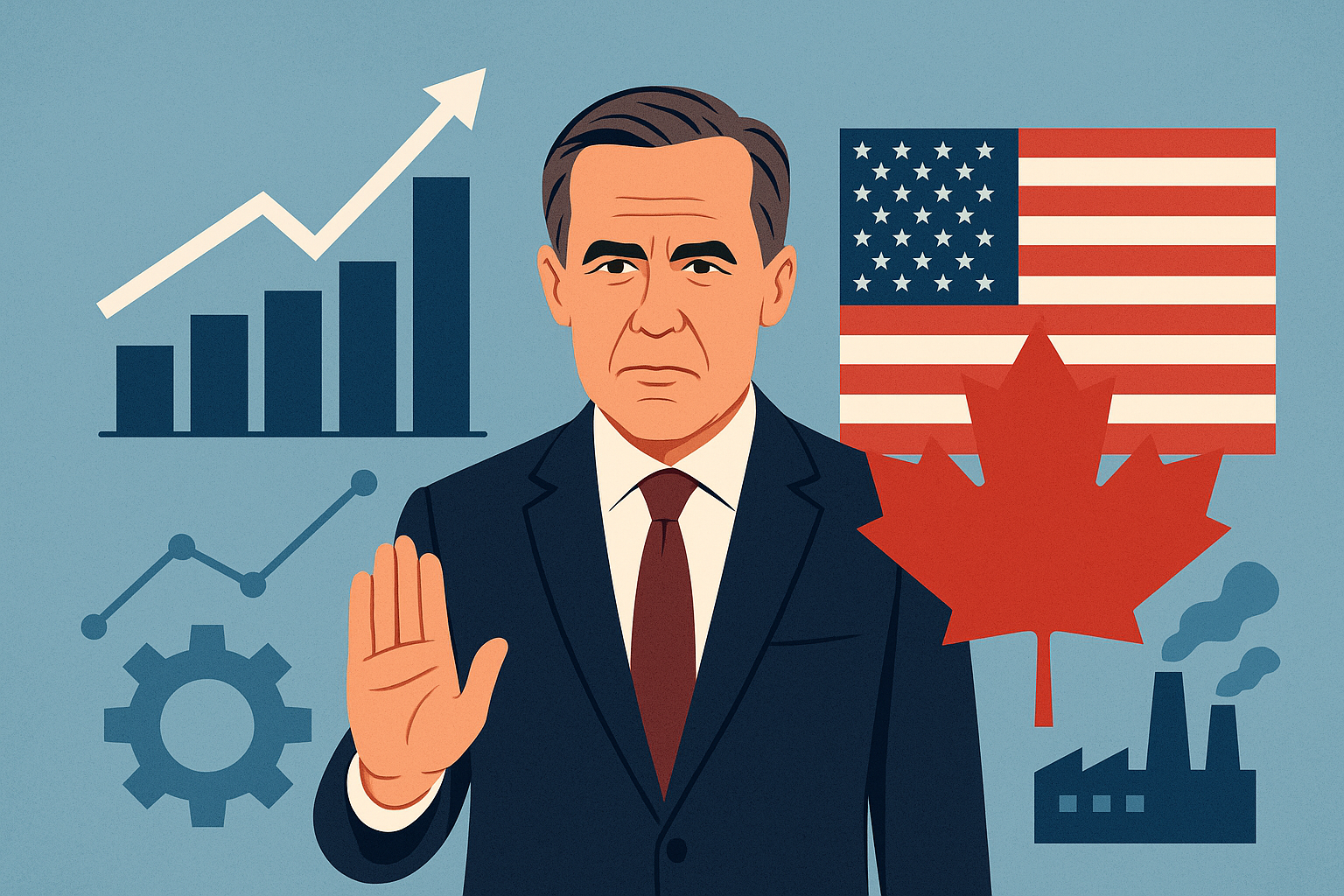The opening night of the Toronto International Film Festival (TIFF) is rarely where investors turn for policy signals, yet Prime Minister Mark Carney used the stage to send a pointed message to both domestic and international audiences. “Don’t push a Canadian too far,” he declared during the premiere of John Candy: I Like Me. Though delivered in a cultural setting, the comment was widely interpreted as a strategic assertion of Canadian sovereignty amid escalating tensions with U.S. President Donald Trump over tariffs and trade.
For investors, the remark was more than political theater—it was a signal of Canada’s shifting stance in cross-border negotiations at a time when global markets remain sensitive to trade friction.
Canada’s Firm Stance in the Face of U.S. Tariffs
Carney’s quip came against the backdrop of heightened U.S.–Canada trade disputes. Trump’s administration has leaned into protectionist rhetoric, threatening higher tariffs on Canadian exports in sectors ranging from energy to autos. Ottawa’s response has been measured but increasingly assertive, balancing diplomacy with efforts to safeguard strategic industries.
Canada’s economy has already shown resilience in 2025. The TSX Composite Index is up over 20% year-to-date in USD terms (Barron’s), driven by strong performance in commodities, energy, and financials. Carney’s leadership has centered on attracting private investment into infrastructure and natural resources, mobilizing more than C$130 billion in public capital and targeting C$500 billion in private inflows. A firm stance against U.S. pressure is likely designed to reinforce market confidence in Canada’s autonomy and investment climate.
Why This Matters for Investors
- Trade Uncertainty Can Drive Volatility
Markets dislike uncertainty, and rising rhetoric from both Washington and Ottawa raises questions about the trajectory of bilateral trade. Investors exposed to cross-border industries—especially auto manufacturing, agriculture, and energy—should prepare for potential tariff-induced disruptions. - Canada as a Relative Safe Haven
With U.S. politics mired in controversy, some investors are looking north for stability. Canada’s fiscal framework, robust banking system, and commodity-driven growth story provide diversification benefits, especially in times of U.S. political turbulence. - Investor Confidence in Canadian Sovereignty
Carney’s words may resonate positively with global capital markets, signaling that Canada will not easily concede to external pressures. Sovereign confidence is often underappreciated but can directly influence foreign direct investment flows.
Future Trends to Watch
- Energy and Resources: Canada continues to benefit from rising demand for metals and energy, particularly as global supply chains realign. Investors should monitor developments in LNG exports and critical minerals, where Canada is positioning as a key global supplier.
- U.S.–Canada Relations: Trump’s tariff threats could escalate or fizzle, depending on negotiations. A breakthrough trade agreement would boost investor confidence, while prolonged friction could weigh on cross-border equities.
- Cultural Diplomacy as Strategy: Carney’s decision to make a pointed remark at TIFF is noteworthy. By aligning national identity with global cultural platforms, Canada is projecting a soft-power message that could influence investor perceptions of long-term stability.
Key Investment Insight
For investors, Carney’s veiled dig at Trump underscores that Canada is not merely a passive player in North American trade disputes. Instead, it is actively leveraging its economic resilience, cultural influence, and resource endowment to project sovereignty. Those with exposure to Canadian equities—particularly in mining, energy, and infrastructure—may find reassurance in Ottawa’s firm posture. Meanwhile, investors in U.S. industries dependent on Canadian trade should prepare for tariff-driven volatility.
The intersection of politics and markets is increasingly global, and signals often emerge from unexpected platforms—like a film festival red carpet. For investors, decoding these cues is critical to navigating the shifting landscape of international trade and capital flows.
Stay with MoneyNews.Today for the latest investor-focused insights on politics, policy, and markets shaping tomorrow’s opportunities.





